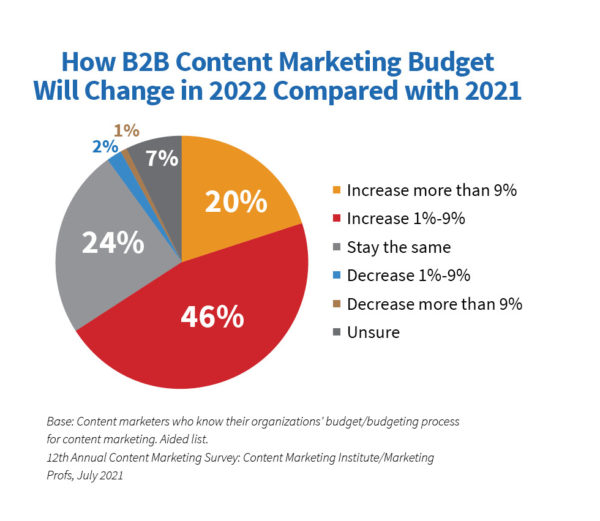Editor’s note: We’ve updated our annual B2B research study for 2023.
Companies are waking up to the power of content marketing due in part to the pandemic.
That’s not some grand pronouncement from the Content Marketing Institute. It’s a recurring refrain we heard from you (or content marketers like you) in our 2022 B2B research.
Among the open-ended responses to “How does your content marketing look post-pandemic?”
- “Who would have thought that a pandemic would be the thing to finally bring content marketing out from behind the shadows and into the forefront of marketing communication?”
- “The pandemic reinforced the importance of our content marketing strategy. There had been a commitment to it, but now that commitment is company-wide and there is more collaboration between marketing and sales.”
- “The pandemic allowed our content marketing approach to come front and center for the whole organization and our leadership team. We now understand the power of what content can do. Our challenge is to be able to tie it into a revenue center that generates leads for the firm.”
These insights add context to the quantitative findings in the B2B Content Marketing Benchmarks, Budgets, and Trends: Insights for 2022 report produced by Content Marketing Institute and Marketing Profs and sponsored by ON24.
CMI Research Director Lisa Murton Beets talked about the findings in a recent livestream event, which you can watch here. Or, read on for highlights from the research.
Content marketing budgets grow
As far as the numbers go, money is one of, if not, the biggest indicator of company support for content marketing.
Forty-three percent of marketers familiar with company spending say their 2021 budgets were higher. And two-thirds of this group (66%) expect increases in the 2022 budget. (One in five says the increase will be greater than 9%.)
Two-thirds of marketers say they expect their #ContentMarketing budget to increase in 2022: New #research from @CMIContent and @MarketingProfs via @EditorStahl. Click To Tweet
Among the areas of investment in 2022, more than half of the marketers expect increased spending in video, events (digital, in-person, hybrid), owned-media assets, and paid media.

HANDPICKED RELATED CONTENT:
Digital events tops among best results
“We work in the clinical trial space, so we were extremely busy with a VERY small team … The shift to virtual events/tradeshow was also a very big lift for us.”
To no one’s surprise, the trend favoring digital events over in-person events continues, and they’ve been successful. Virtual events/webinars/online courses produced the best content marketing results in the last 12 months among all formats.

And while the use of in-person events has dropped precipitously in the last two years (73% vs. 19%) don’t count them out in a post-vaccination world. Of the marketers familiar with their organization’s content marketing budget, 52% percent expect in-person event investment to increase while 39% say spending for hybrid events will grow.
52% of marketers expect in-person event investment to increase in 2022 via @EditorStahl @CMIContent. #Research Click To Tweet
Budget boosts don’t increase team size
“Our company increased its respect for our messaging strategy and content marketing efforts, though it also demanded more from our small team.”
Two-thirds (67%) of marketers say their team was asked to do more with the same resources. Whether they were asked to do more or not, content marketing team sizes didn’t grow. Both last year and this year, only 10% of respondents had six or more on their content marketing teams while 58% this year and 57% last year had only one or no full-time person dedicated to content marketing.
One marketer explains their situation: “The pandemic slowed things down for us. We were going to hire support for content, but we haven’t been able to. So, we’re doing more with less/the same and it’s tricky.”

Half of all marketers say they outsource some content marketing – that’s on par with a year ago (49%), but we saw a marked difference at larger companies (1,000 or more employees). A year ago, 61% of these marketers at large companies outsourced content marketing. This year, that percentage has risen to 75%.
Budget concerns for outsourcing also were not as prevalent as the previous year. Forty percent of marketers say budget issues are a top challenge in outsourcing content marketing help – down from 50% the previous year.

HANDPICKED RELATED CONTENT:
Brand awareness, credibility/trust, and education still top reasons why
“We understood that digital does not exist without real life. We are now working on more ‘daily and authentic content’ for brand awareness and trust. Selling will be the last step, not the first one.”
While content marketing’s profile has risen in companies, its top goal remains brand awareness (as it has nearly every year in the dozen years we’ve done this research.) Eighty percent of marketers say report success in achieving brand awareness, with 75% say it builds credibility/trust and 70% say their content marketing educates audiences.
Top performers – those who say their organizations are extremely or very successful with content marketing – surpass their peers in these goals and many others.
Pandemic forces marketers to be more empathetic
As content marketing has evolved inside companies in the past year, content marketers also have evolved their approach – talking to their B2B audiences as humans, not just members of buying committees, accounts, or brands. (And, as we heard again and again at Content Marketing World this year, that’s the key to building trust and creating better experiences.)
Not surprisingly, their audiences like being treated as real people. Among the responses to the open-ended responses to post-pandemic impact question:
“We increased our empathy toward our audience and found them to be more receptive.”
- “It re-emphasized the need for authentic relationships, and to not take anyone for granted.”
- “Many of our potential customers had a very rough year, while our revenue actually went up. We had to practice a lot of compassion and restraint.”
- “We became a more customer-sensitive organization. I constantly push for fewer words about who we are and what we do in favor of more words about client challenges and triumphs.”
- “More empathy and less hard sell. We don’t want to kick people when they’re down. If your only objective is to force someone down your journey or path, you should find another job. Give more and take less.”
HANDPICKED RELATED CONTENT:
What about you?
Did your content become more empathetic? How did your strategy change? What do you see for the future of content marketing in your organization?
We hope these results are helpful as you develop your 2022 content marketing strategy and budgets. Let us know what you see yourself investing in – and whether content marketing has finally taken a seat at the table in YOUR company.
Download the report today for these and many other insights on content strategy, content creation and distribution, metrics and goals, and action steps for content marketing in 2022.
Cover image by Joseph Kalinowski/Content Marketing Institute

